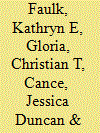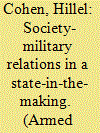|
|
|
Sort Order |
|
|
|
Items / Page
|
|
|
|
|
|
|
| Srl | Item |
| 1 |
ID:
114022


|
|
|
|
|
| Publication |
2012.
|
| Summary/Abstract |
American military institutions importantly shaped the popular sport of college football. From support at its two oldest service academies, interest in football spread through military units across the country with military actors involved in the formation of the country's first collegiate athletic conference and the National Collegiate Athletic Association. Subsequently, the US military functioned as an agent of authoritative diffusion, fostering interest in college football after the First World War. Furthermore, military institutions, including the draft, affected not only which team would be most successful during the Second World War but also how civilians would play the game. These effects call to mind Charles Tilly's work on state formation and security-driven resource extraction as well as Harold Lasswell's garrison state idea.
|
|
|
|
|
|
|
|
|
|
|
|
|
|
|
|
| 2 |
ID:
114023


|
|
|
|
|
| Publication |
2012.
|
| Summary/Abstract |
Using the Broaden-and-Build Theory of Positive Emotions, the relationships among stress, positivity, and depressive symptoms were examined in a sample of military spouses during deployment (N = 367). Over one-third of the spouses reported moderately severe levels of depressive symptoms. After controlling for demographic and deployment variables, stress had a positive association with depressive symptoms (ß = .59, p < .001), while positivity had a negative association (ß = -.39, p < .001). Positivity was also found to play a moderating role on the relationship between stress and depressive symptoms (ß = -.29, p < .001). Spouses with lower positivity reported more depressive symptoms at both low and high levels of stress compared to those with higher positivity. The final model, including both direct and moderating variables, accounted for 69 percent of the total variance in depressive symptoms. Practical implications are discussed in terms of the importance of developing positivity in military spouses.
|
|
|
|
|
|
|
|
|
|
|
|
|
|
|
|
| 3 |
ID:
114026


|
|
|
|
|
| Publication |
2012.
|
| Summary/Abstract |
This essay interrogates popular beliefs about Islamization of the Pakistan Army officer corps and the polity from which the army recruits. It first assembles and synthesizes the extant secondary literature on Islamization of Pakistan generally, and the army in particular. As access to the Pakistan Army diminished after 1990 when numerous US sanctions on Pakistan limited defense cooperation and other forms of bilateral engagements, this secondary literature is generally truncated to 1990. To expand what is known about the Pakistan Army, this essay next presents the results of an ongoing quantitative analysis of district-level officer recruitment (and retirement) data. This ecological study finds that, as recently as 2002, districts that produce army officers are actually more socially liberal and urban than is commonly believed. This essay discusses the implications of the changes in the officer corps and concludes with a call for a robust research agenda on the Pakistan Army.
|
|
|
|
|
|
|
|
|
|
|
|
|
|
|
|
| 4 |
ID:
114025


|
|
|
|
|
| Publication |
2012.
|
| Summary/Abstract |
This study examines the decision-making process of the George W. Bush administration which led to the decision in late 2006 to order the Iraq troop surge. The study analyzes whether the bureaucratic politics model of foreign policy decision making can accurately explain the events of the case. The study seeks to further test the explanatory power and descriptive accuracy of the bureaucratic politics model, while also attaining a more textured, academic understanding of the decision-making process leading to the Iraq troop surge. The decision to order the troop surge in Iraq is one of the more important decisions in post-9/11 U.S. foreign policy and continues to impact U.S. strategy in Iraq, Afghanistan, and overall military doctrine. Finally, the author endeavors to contribute to the further development and refinement of the bureaucratic politics model of foreign policy decision making.
|
|
|
|
|
|
|
|
|
|
|
|
|
|
|
|
| 5 |
ID:
114024


|
|
|
|
|
| Publication |
2012.
|
| Summary/Abstract |
Public opinion studies on war attitudes say little about civilians who are related to military service members. The authors argue that military "service-connected" individuals are missing voices in the research that examines public support for war. Using over 50,000 observations from the 2010 Cooperative Congressional Election Study, the authors estimate attitudes toward the war in Iraq, the war in Afghanistan, and the use of US military troops in general. The authors find that service-connected civilians express greater support for war and the use of troops than civilians without such a connection. This study discusses the implications of these findings for theoretical advancements in the literature addressing war attitudes and the conceptualization of the "civil-military gap."
|
|
|
|
|
|
|
|
|
|
|
|
|
|
|
|
| 6 |
ID:
114030


|
|
|
|
|
| Publication |
2012.
|
| Summary/Abstract |
The current military assignment policy of United States prohibits the assignment of females to billets with high risk of combat exposure. As part of an Army review of this policy, the authors analyzed deployment and promotion risk for combat medics. The effect of current policy on male deployment and female promotion risk was unknown. In light of other countries' policies and current operational considerations, senior military leaders sought to understand the effects of existing policy on a low-density, high-value occupational specialty, the combat medic. The authors found evidence that male medics deployed 2.07 times more frequently than female medics. The authors also found evidence that senior male medics (staff sergeants) deployed even more frequently (3.65-1) than their female counterparts. Perhaps as a result, the male combat medics experience higher likelihood of promotion from staff sergeant (E-6) to the rank of sergeant first class (E-7); however, the magnitude of that benefit was about one-third of the deployment risk. The results confirm the existence of gender-based deployment risk and promotion disparity. Based upon this analysis, the authors recommended the deprecation of current gender coding for combat medics to the senior levels of the US Army.
|
|
|
|
|
|
|
|
|
|
|
|
|
|
|
|
| 7 |
ID:
114031


|
|
|
|
|
| Publication |
2012.
|
| Summary/Abstract |
In Fall 2010, the last group of students enrolled in the Russian Military Academy of the General Staff (MAGS). This important military educational institution, which has existed in some form or another for almost two centuries, will cease to exist as an academy in 2012. This research note provides a description of graduates of the MAGS, utilizing survey data collected between 2000 and 2008. This data revealed key sociodemographic characteristics of MAGS students as well as service motivations and value sets.
|
|
|
|
|
|
|
|
|
|
|
|
|
|
|
|
| 8 |
ID:
114028


|
|
|
|
|
| Publication |
2012.
|
| Summary/Abstract |
The participation of the Palestinian Authority's (PA's) security agencies in the armed struggle against Israel in the second Palestinian uprising (2000-2005) is analyzed in this article as a response to the demand of Palestinian society, thus as a unique case of armed forces which, in the lack of political directive, became more attentive to public opinion. The article shows how Palestinian public discourse in the late 1990s-early 2000s, that was shaped by the Islamic movement of Hamas, portrayed the PA's security officials as traitors. Members of the PA security agencies (mainly Fatah members) sought to reposition themselves in the "national camp," and this motivated them to raise their weapons against Israeli targets. By doing so, they also removed the mental burden of turning their weapons against fellow Palestinians that was one of the major sources for their image as collaborators.
|
|
|
|
|
|
|
|
|
|
|
|
|
|
|
|
| 9 |
ID:
114029


|
|
|
|
|
| Publication |
2012.
|
| Summary/Abstract |
Academics and other commentators have posited a voter preference for veterans in American Presidential elections. Indeed, Albert Somit, in an oft cited article in Public Opinion Quarterly (Vol. 12, 1948, 192-200), went so far as to maintain that on the basis of the historical record, "a party nominating a military hero [for president] would be enhancing its chances of winning the election," and called for such nominations to provide "a real test of this thesis." (p. 200) This research note raises questions about Somit's research methodology, offers one of its own, and finds Somit's and other commentators' claims to be unfounded. It concludes with some considerations as to why these claims were faulty.
|
|
|
|
|
|
|
|
|
|
|
|
|
|
|
|
|
|
|
|
|